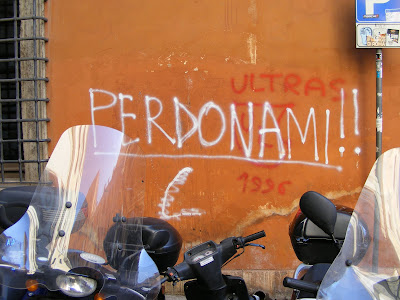
Graffiti has been vindicated in recent years as Banksy has brought his work off the streets and in to gallery spaces. There is a lot more appreciation for the talent and thought which informs this underground culture. On my European travels I have always been interested in documenting, with my camera, the particular graffiti-culture of the cities I visit. It seems that each country and each city has a different approach to their medium and a unique motivation.

Madrid- characterised by bright, vibrant graphics, powerful letters, explosions of colour.
Yesterday when I wrote that sculpture more than any art form is in dialogue with its surroundings, I was not considering graffiti. Graffiti doesn't simply furnish buildings, roads and pavements; when we visit a city we absorb its graffiti as an integral part of its vista. But graffiti is not a permanent feature, its power is in its transience. While architecture remains an archaism, a monument to the past, graffiti is that part of the city which adapts with its people, with the moving, breathing, developing culture.

Bucharest- Romania, 'Women! Don't tolerate misogyny' in Romania graffiti appeared to have a bitter political ambition, scrawled with a fire and an urgency or stencilled with powerful irony.

Prague-Czech Republic, appeared to me to be obsessed with stencil graffiti, with repeating patterns across the city.
Portugal

Budapest, Hungary
Rome was all about the effortless scribble, as if the entire city were a notepad for the scrawls of its people.


merry christmas
ReplyDeletekiss
antonio
I enjoyed this post cuz I too like graffiti and take photos in my travels. I love the one from Budapest!
ReplyDelete